In this issue, we will be covering:
- Feature Article: Update - State OSH Plans.
- Product Feature: Operator Requalification Materials.
- 2023 Columbia Forklift Challenge: CFC Crowns the Best in the Northwest!
- Upcoming Program Calendar.
- Incident Report: Colorado contractor facing manslaughter charges after worker dies.
- Ask Bob: Our tech guru answers a question about grace periods on expired certifications.
- A selection of interesting articles.
- New testimonials from our wonderful clients.
But first, check out all the places we are delivering training this month...
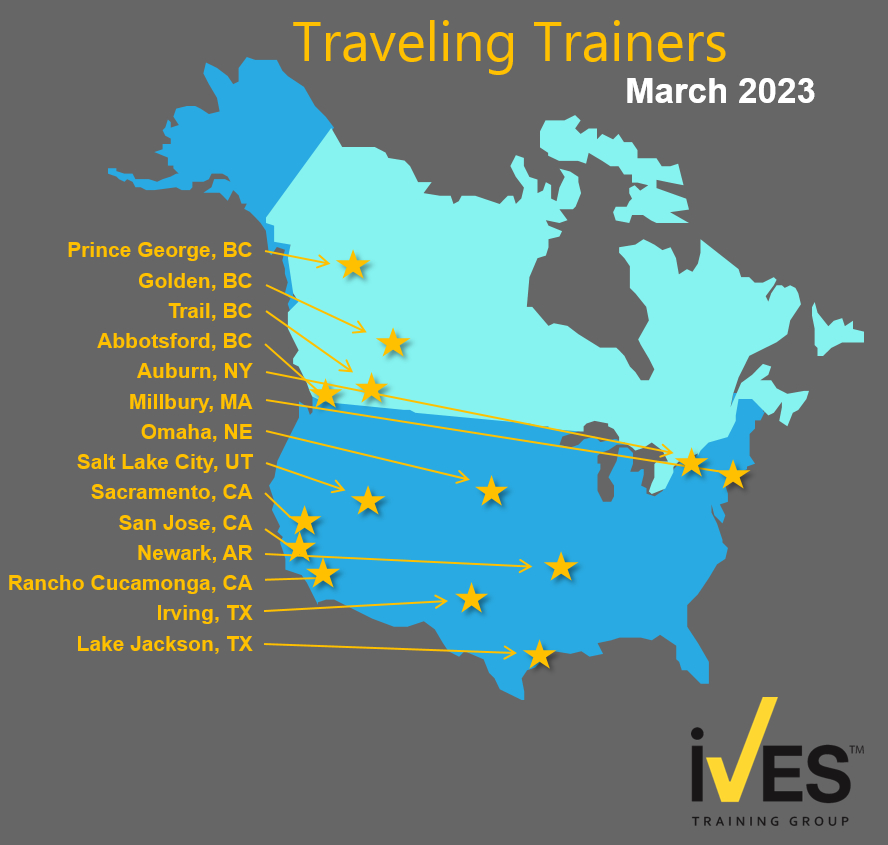
Update: State OSH Plans
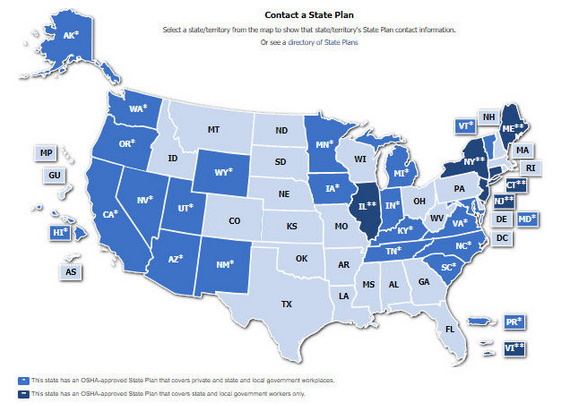 In the United States, about half the states have their own Occupational Safety and Health (OSH) plan approved by federal OSHA as being “at least as effective” as federal OSH regulations. Most state plans build upon federal regulations by adding specific requirements, some have them sprinkled throughout while others focus on particular industry segments. When it comes to the safe use of powered mobile equipment (PME), particularly operator training, they are all very close if not identical to federal OSHA regulations.
In the United States, about half the states have their own Occupational Safety and Health (OSH) plan approved by federal OSHA as being “at least as effective” as federal OSH regulations. Most state plans build upon federal regulations by adding specific requirements, some have them sprinkled throughout while others focus on particular industry segments. When it comes to the safe use of powered mobile equipment (PME), particularly operator training, they are all very close if not identical to federal OSHA regulations.
I closely monitor and review the federal and state plans often and usually, when I notice a change that affects IVES, I make sure those changes are reflected in our programs and materials if and when it is appropriate. Since most of the changes made are relatively insignificant, IVES makes them without too much fanfare, typically with a note in the IVES Update monthly e-newsletter or a minor change to the lesson plans affected.
Recently, it occurred to me that we’ve reacted to a fair amount of regulatory changes over the past 24 months or so and while reviewing them, I found a few worthwhile updates to share with trainers that work within certain US states or territories and listed them below. If a state is not mentioned, it means nothing was found that we don’t already address appropriately, or that the state adopts the Federal OSHA regulations to the letter.
 1. Arizona- Arizona tried to change its fall protection requirements some years ago to make the requirement to use fall protection kick in at 15-ft. This contradicted federal requirements that do so at 6-ft. For this and several other reasons, OSHA decided to reject approval of the AZ state plan. However, the two managed to work things out and OSHA recently announced it will withdraw its proposal to revoke final approval of Arizona’s state plan. Some people out there may still think the general rule is that fall protection is not required in AZ until working at heights of 15-ft or more, which is not the case, it’s still 6-ft.
1. Arizona- Arizona tried to change its fall protection requirements some years ago to make the requirement to use fall protection kick in at 15-ft. This contradicted federal requirements that do so at 6-ft. For this and several other reasons, OSHA decided to reject approval of the AZ state plan. However, the two managed to work things out and OSHA recently announced it will withdraw its proposal to revoke final approval of Arizona’s state plan. Some people out there may still think the general rule is that fall protection is not required in AZ until working at heights of 15-ft or more, which is not the case, it’s still 6-ft.
 2. Minnesota and South Carolina- Both of these states adopt the federal OSHA regulations for forklifts but unlike the feds, they include an old OSHA requirement that states:
2. Minnesota and South Carolina- Both of these states adopt the federal OSHA regulations for forklifts but unlike the feds, they include an old OSHA requirement that states:
(m)(12) Whenever a truck is equipped with vertical only, or vertical and horizontal controls elevatable with the lifting carriage or forks for lifting personnel, the following additional precautions shall be taken for the protection of personnel being elevated: (ii) Means shall be provided whereby personnel on the platform can shut off power to the truck.

Personally, over my many years of working with this equipment, I have never come across a standard, counterbalanced forklift equipped with these types of controls or for that matter, a forklift-mounted platform with on-board lift/lower controls, although on rare occasion I have seen rough terrain telehandlers with this type of equipment. In any case, it is a requirement in these states so it is enforceable.
3. Michigan- Here are a couple of exceptions to the federal regulations that you may find useful:
 a) The overhead guard tests are listed as “static” tests with different specifications than the relevant “impact” tests listed in the ANSI B56 standards, which the MIOSHA regulations also reference. I am no engineer, so I assume MIOSHA’s static tests are comparable to ANSI’s impact tests in rating the structural integrity of the overhead guard. As a side note here, what ANSI refers to as an “overhead guard” is often called a Falling Object Protective Structure (FOPS) by manufacturers and other industry organizations.
a) The overhead guard tests are listed as “static” tests with different specifications than the relevant “impact” tests listed in the ANSI B56 standards, which the MIOSHA regulations also reference. I am no engineer, so I assume MIOSHA’s static tests are comparable to ANSI’s impact tests in rating the structural integrity of the overhead guard. As a side note here, what ANSI refers to as an “overhead guard” is often called a Falling Object Protective Structure (FOPS) by manufacturers and other industry organizations.
b) Motorized hand trucks (low-lift powered pallet trucks) are excluded from the PIT training requirements. However, as we all know, you still need to train employees on any tool they use in the workplace so it’s best to put them through formal training and evaluation for their own safety and to have the process documented.
c) MIOSHA R 408.12174 Parking. Rule 2174 (1) states: When leaving a powered industrial truck unattended, an operator shall fully lower the forks flat to the floor, neutralize the controls, set the brakes, and shut the power off. (2) Whenever it is necessary to leave a truck on an incline, the truck wheels shall be blocked and the steering wheels turned toward the curbing, wall or railing.
Now of course we know that you shouldn’t be parking on a grade to start with but if it were necessary it could be potentially scary because there may not be any curbing, walls or railings to turn the steer wheels toward!
 4. Maryland- This state adopts all the Federal regulations but has exceptions when it comes to the requirements for excavations. Anyone that uses earthmoving equipment for excavations needs to make sure they have the required ‘written plans’ on site as per state requirements. You can find them here.
4. Maryland- This state adopts all the Federal regulations but has exceptions when it comes to the requirements for excavations. Anyone that uses earthmoving equipment for excavations needs to make sure they have the required ‘written plans’ on site as per state requirements. You can find them here.
 5. Massachusetts- This state has a state ‘hoisting license’ requirement for all powered mobile equipment operators. Operators must go through proper training within their company, but also have the state license as well. However, trainers/employers can apply for an exemption by submitting their training program to exclude their operators from this state requirement if approved.
5. Massachusetts- This state has a state ‘hoisting license’ requirement for all powered mobile equipment operators. Operators must go through proper training within their company, but also have the state license as well. However, trainers/employers can apply for an exemption by submitting their training program to exclude their operators from this state requirement if approved.
a) You can find the requirements here.
b) You can find exemption information here.
 6. New York- Back to excavations, NY has a law in place that requires any municipality or operator that engages in excavation work to require excavator operators to complete the state’s training and education program from their local “One-Call Notification Center”. The training is free and available online. It is comprised of a series of videos with quiz questions throughout. It’s important to note that NY’s state OSH plan only applies to state and local government workers so this requirement does not apply to workplaces in the private sector, but it’s not a bad idea for anyone involved in excavations to complete. Click here for more information.
6. New York- Back to excavations, NY has a law in place that requires any municipality or operator that engages in excavation work to require excavator operators to complete the state’s training and education program from their local “One-Call Notification Center”. The training is free and available online. It is comprised of a series of videos with quiz questions throughout. It’s important to note that NY’s state OSH plan only applies to state and local government workers so this requirement does not apply to workplaces in the private sector, but it’s not a bad idea for anyone involved in excavations to complete. Click here for more information.
Well, that’s all I have to report for now folks. We’ll keep you updated on any other changes we come across and feel free to contact us if you find any changes in your local PME laws and let us know. Be safe out there.
Nick Armer
Chief Master Trainer
Product Feature: Operator Requalification Materials
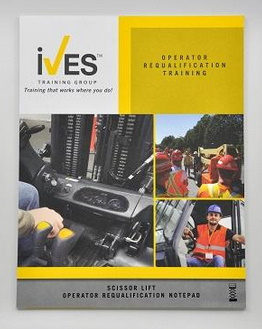
Requalification Materials are available for standard forklifts, narrow aisle forklifts, powered pallet trucks, rough terrain telehandlers, aerial boomlifts, and scissor lifts.
Requalification programs must be delivered at regular intervals as mandated by government regulations for forklift operators.
Re-training and re-evaluation of forklift and mobile elevating work platform (MEWP) operators must also be performed based on incidents attributable to operator error or on the observations of the employer.
¿Hablas español? Select items are also available in Spanish.
Click to browse or purchase our Requalification Materials.
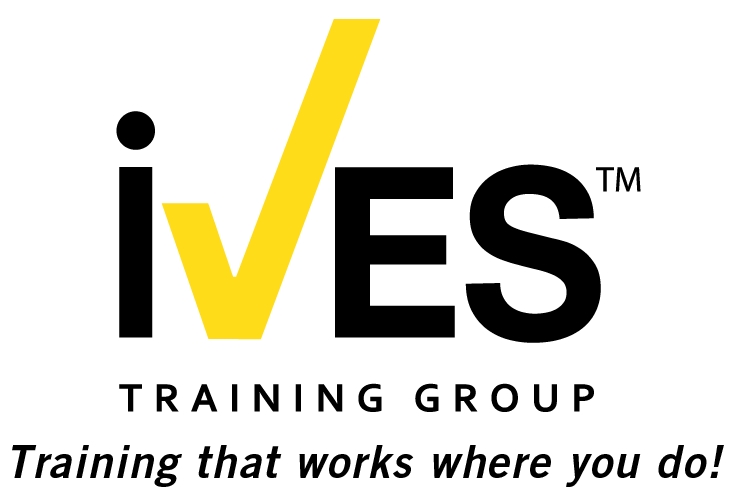
And the Winners Are...CFC Crowns the Best in the Northwest!
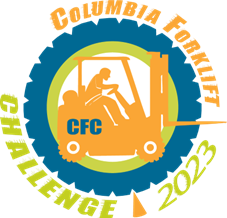 The 2023 Columbia Forklift Challenge (CFC) concluded on Wednesday March 8 to a resounding success. A total of 23 competitors representing various industries in Oregon and Washington tested their skills and knowledge of safe forklift operations through a challenging course involving intricate maneuvering, precise stacking, and of course – the CFC’s signature task, the bowling ball strike attempt.
The 2023 Columbia Forklift Challenge (CFC) concluded on Wednesday March 8 to a resounding success. A total of 23 competitors representing various industries in Oregon and Washington tested their skills and knowledge of safe forklift operations through a challenging course involving intricate maneuvering, precise stacking, and of course – the CFC’s signature task, the bowling ball strike attempt.
Of course, the CFC couldn’t happen without our terrific sponsors: Ives Training Group, Pape Material Handling, Cascade Corporation, Equipment Depot, United Pacific Forest Products, City of Portland Water Bureau, and the Boeing Company.
And now (drum roll please), the winners are…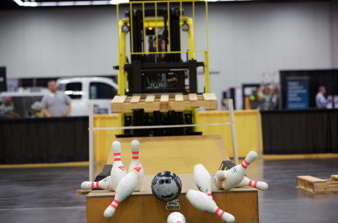
Individual Winners:
- First Place ($500) David Polendey, Timber Products Company
- Second Place ($350) Andrew Ibbotson, Lineage Logistics
- Third Place ($200) Mitchell Bivens, Nortek Air Solutions
Team Prize ($450):
- Timber Products Company (Dyrk Dorris, David Polendey, Ryan Ruska)
The Columbia Forklift Challenge is held biennially during the Oregon Governor’s Occupational Safety and Health Conference in Portland, OR. Please mark your calendar for our next one during the first full week of March 2025.
Craig Hamelund – CFC Event Organizer
Incident Report: Colorado contractor facing manslaughter charges in workers death.
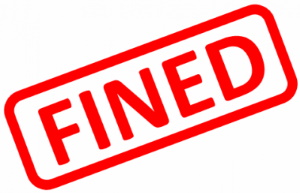 The owner of a Vail construction company facing felony manslaughter charges has surrendered to local law enforcement after the Summit County Sheriff's Office in Breckenridge, Colorado, issued an arrest warrant on Jan. 24, 2023, related to the findings of a federal safety investigation into a deadly trench collapse in November 2021.
The owner of a Vail construction company facing felony manslaughter charges has surrendered to local law enforcement after the Summit County Sheriff's Office in Breckenridge, Colorado, issued an arrest warrant on Jan. 24, 2023, related to the findings of a federal safety investigation into a deadly trench collapse in November 2021.
In May 2022, the U.S. Department of Labor's Occupational Safety and Health Administration cited Peter Dillon, owner of the now-defunct A4S LLC, after a worker installing residential sewer pipes suffered fatal injuries when the trench around him caved in.
The collapse resulted from deteriorating conditions at the project, which A4S LLC could have prevented by using legally required trench protection systems.
OSHA issued three willful citations to A4S LLC for not ensuring the excavation was inspected by a competent person, failing to instruct employees on the recognition and avoidance of unsafe conditions and not having a trench protective system in place.
Investigators also issued an additional serious citation for not having a safe means of egress within 25 lateral feet of employees working in a trench.
The agency proposed penalties of $449,583 USD and placed the company in OSHA’s Severe Violator Enforcement Program.
The department referred the case to the 5th Judicial District Attorney's office recommending criminal charges for A4S LLC's refusal to require safety protection, despite worsening trench conditions that included at least one trench collapse.
A4S LLC has since shuttered and Dillon agreed to forfeit any future ownership, leadership or management position that involves trenching or excavation, or the oversight of workplace safety and health.
"There is no excuse for Peter Dillon’s failures to protect workers when federal requirements clearly outline and require safety measures proven to save lives," explained Regional Solicitor of Labor John Rainwater in Dallas.
"Today's arrest by the Summit County Sheriff's Office cannot recover a life lost in this senseless tragedy but it is a step toward seeking justice for the family."
Collapses and cave-ins pose the greatest threat to trenching and excavation workers.
In 2022, OSHA reported that at least 39 industry workers died, 22 of them in the first six months of the year.
The Bureau of Labor Statistics reports that 166 workers died in trench collapses from 2011 to 2018.
"Let this tragedy serve as a reminder to other employers who willingly fail in their responsibilities to keep workers safe that the U.S. Department of Labor will exhaust every resource to hold employers accountable for protecting workers, including recommending criminal prosecution.
OSHA has pledged to work with state prosecutors to raise the stakes in appropriate trenching death cases, and this is an example," added OSHA Regional Administrator Jennifer S. Rous in Denver.
OSHA has a National Emphasis Program on trenching and excavations.
Trenching standards require protective systems on trenches deeper than 5 feet.
Additionally, trenches must be inspected by a knowledgeable person and have a safe means of entering and exiting prior to allowing a worker to enter.
Source: OSHA News
 Ask Bob
Ask Bob
Free technical support for all IVES Certified Trainers!
Question:
Hi Bob,
Does OSHA have a regulation or policy concerning how long an Operator's certification can be expired before they have to take training over again or is there no limit for how long a certification can lapse?
As long as the driver can pass the written exam and a practical test, can they be re-qualified without re-taking the course?
Answer:
Thanks for checking in with us.
OSHA does not recognize any kind of grace period for expiration and retraining, nor do they have any guidance on how long can they go past their expiration without having to do initial training all over again.
We suggest that if they are over by 6 months or more, that you conduct initial training all over to keep the documentation clean.
Bob
Interesting Articles
- US Dept of Labor to withdraw proposal to reconsider, revoke Arizona's OSHA plan...more.
- Father of 20 year old, who died after telehandler fall, given reduced prison sentence..more.
- Man given lifetime award after rescuing the world's oldest steam excavator..more.
- Worker's wife suing contractors after worker fell off a scissor lift...more.
- Excavator rescues mother and baby elephant that were trapped in pit [VIDEO]...more.
- Roofing contractor faces $234k in penalties for exposing workers to fall hazards...more.
- Safety video shows the dangers of having passengers on forklifts [VIDEO]...more.
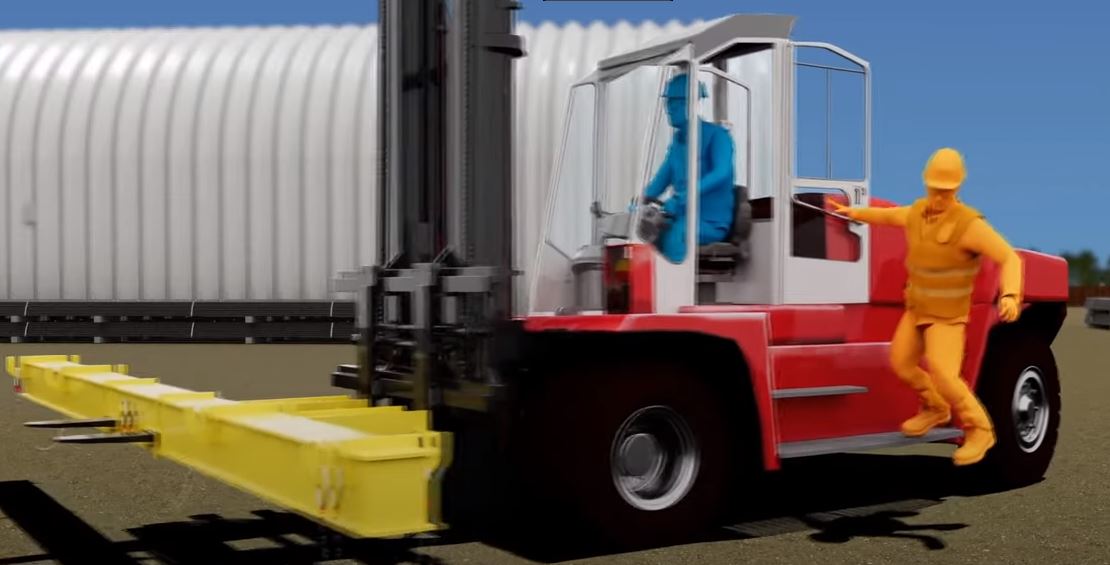
 Client Testimonials
Client Testimonials
"I thought the progression of the class from Day 1 to the final day helped me fully understand everything taught throughout the week." Anthony, Premium Forklift Train the Trainer Program.
"A great experience, definitely wasn’t expecting this kind of training, but really glad I followed through. Definitely would recommend!" Robert, Premium Combo Train the Trainer Program.
"I’m pleasantly surprised on the new evaluation forms. I also will be using the website more often." Travis, Online Trainer Recertification.
Did you enjoy this newsletter? Sign up for our newsletter to receive more like this!